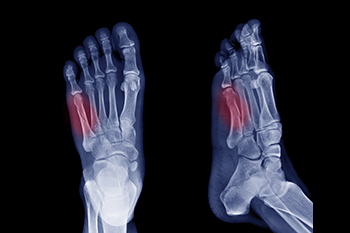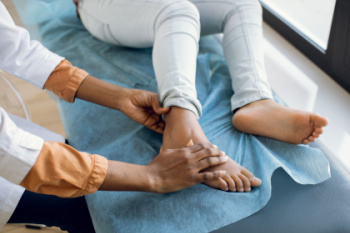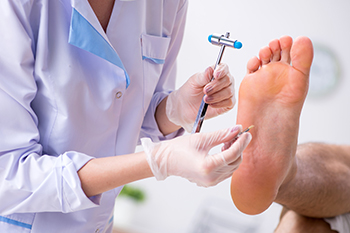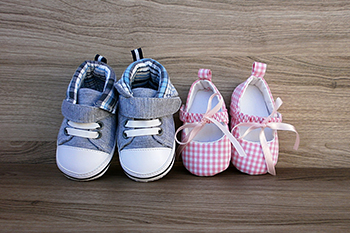Items filtered by date: January 2025
Jones Fracture Symptoms

A Jones fracture refers to a break or crack in the fifth metatarsal bone, located on the outer side of the foot near the ankle. Symptoms typically include pain, swelling, bruising, tenderness on the outer part of the foot, and difficulty walking. Diagnosis usually involves a visit to a podiatrist, who will perform a physical examination, review the symptoms, and take a detailed medical history. To confirm the fracture, imaging tests like X-rays are commonly used. Treatment options depend on the severity of the fracture. For minor cases, rest, mild pain relievers, and possibly a cast or splint may be recommended. Crutches could also be necessary to help avoid putting weight on the affected foot. In more severe cases, surgery may be required to properly heal the bone. Full recovery can take several months, so it is important to allow enough time for the bone to heal completely to prevent further injury. If you suspect you have a Jones fracture, it is suggested that you consult a podiatrist for an accurate diagnosis and personalized treatment plan.
A broken foot requires immediate medical attention and treatment. If you need your feet checked, contact Dr. John Branwell from Kearny, New Jersey. Our doctor can provide the care you need to keep you pain-free and on your feet.
Broken Foot Causes, Symptoms, and Treatment
A broken foot is caused by one of the bones in the foot typically breaking when bended, crushed, or stretched beyond its natural capabilities. Usually the location of the fracture indicates how the break occurred, whether it was through an object, fall, or any other type of injury.
Common Symptoms of Broken Feet:
- Bruising
- Pain
- Redness
- Swelling
- Blue in color
- Numbness
- Cold
- Misshapen
- Cuts
- Deformities
Those that suspect they have a broken foot shoot seek urgent medical attention where a medical professional could diagnose the severity.
Treatment for broken bones varies depending on the cause, severity and location. Some will require the use of splints, casts or crutches while others could even involve surgery to repair the broken bones. Personal care includes the use of ice and keeping the foot stabilized and elevated.
If you have any questions please feel free to contact our office located in Kearny, NJ . We offer the newest diagnostic and treatment technologies for all your foot and ankle needs.
How Foot Pain Interferes With Comfortable Living

Foot pain can stem from various conditions, including plantar fasciitis, bunions, flat feet, arthritis, or injuries like sprains and fractures. Even seemingly minor discomfort can significantly impact daily activities, affecting mobility, balance, and overall quality of life. Chronic foot pain may also lead to compensation issues, causing pain in the knees, hips, or back. Ignoring persistent pain can worsen underlying conditions, making treatment more complex. Addressing foot pain begins with identifying the cause. Rest, proper footwear, and targeted stretching exercises can help in mild cases. Custom orthotics or surgical intervention may be necessary for persistent or severe pain. Early intervention is key to preventing long-term complications. If foot pain disrupts your routine, it is suggested that you consult a podiatrist for an accurate diagnosis and an effective treatment plan tailored to your needs.
Foot Pain
Foot pain can be extremely painful and debilitating. If you have a foot pain, consult with Dr. John Branwell from Kearny, New Jersey. Our doctor will assess your condition and provide you with quality foot and ankle treatment.
Causes
Foot pain is a very broad condition that could be caused by one or more ailments. The most common include:
- Bunions
- Hammertoes
- Plantar Fasciitis
- Bone Spurs
- Corns
- Tarsal Tunnel Syndrome
- Ingrown Toenails
- Arthritis (such as Gout, Rheumatoid, and Osteoarthritis)
- Flat Feet
- Injury (from stress fractures, broken toe, foot, ankle, Achilles tendon ruptures, and sprains)
- And more
Diagnosis
To figure out the cause of foot pain, podiatrists utilize several different methods. This can range from simple visual inspections and sensation tests to X-rays and MRI scans. Prior medical history, family medical history, and any recent physical traumatic events will all be taken into consideration for a proper diagnosis.
Treatment
Treatment depends upon the cause of the foot pain. Whether it is resting, staying off the foot, or having surgery; podiatrists have a number of treatment options available for foot pain.
If you have any questions, please feel free to contact our office located in Kearny, NJ . We offer the newest diagnostic and treatment technologies for all your foot care needs.
Types of Conditions Podiatrists Treat

A podiatrist specializes in diagnosing, treating, and preventing conditions related to the feet, ankles, and lower extremities. Podiatrists are trained to address foot problems, including bunions, heel pain, ingrown toenails, and plantar fasciitis. They also treat more serious conditions such as fractures, infections, and deformities that affect mobility. Podiatrists play an important role in managing chronic diseases that impact foot health, such as diabetes, which can lead to complications like neuropathy and poor circulation. There are various types of podiatrists based on their areas of expertise. Some specialize in surgery, performing procedures to correct deformities or injuries, while others focus on sports medicine, pediatric care, or diabetic foot care. Regardless of their specialty, podiatrists are essential in maintaining foot health and ensuring proper mobility for people of all ages. If you have foot pain or developed a foot condition, it is suggested that you consult a podiatrist who can accurately diagnose and treat various foot conditions.
If you are dealing with pain in your feet and ankles, you may want to seek help from a podiatrist. Feel free to contact Dr. John Branwell from Kearny, New Jersey. Our doctor can provide the care you need to keep you pain-free and on your feet.
What Is a Podiatrist?
A podiatrist is a doctor of podiatric medicine who diagnoses and treats conditions of the foot, ankle, and related structures of the leg. Your podiatrist may specialize in a certain field such as sports medicine, wound care, pediatrics, and diabetic care. Podiatrists have the ability to become board certified through training, clinical experience, and then taking an exam.
What Do Podiatrists Do?
On a daily basis, a podiatrist may perform the following activities:
- Diagnose foot ailments such as ulcers, tumors, fractures, etc.
- Use innovative methods to treat conditions
- Use corrective orthotics, casts, and strappings to correct deformities
- Correct walking patterns and balance
- Provide individual consultations to patients
It is very important that you take care of your feet. It’s easy to take having healthy feet for granted, however foot problems tend to be among the most common health conditions. Podiatrists can help diagnose and treat a variety of feet related conditions, so it is crucial that you visit one if you need assistance.
If you have any questions please feel free to contact our office located in Kearny, NJ . We offer the newest diagnostic and treatment technologies for all your foot and ankle needs.
It's Time for Beautiful Feet
Choosing Baby's 1st Walking Shoes

First walking shoes are an important milestone in a baby's development, offering both support and comfort as they take their first steps. There are several types of first walking shoes designed to meet the needs of growing feet. Soft-soled shoes are ideal for early walkers as they provide flexibility while offering protection against rough surfaces. These shoes allow babies to feel the ground, which helps with balance and coordination. Hard-soled shoes are better suited for toddlers who are more confident walkers, offering stability and durability for outdoor adventures. Another option is sandals with secure straps, which provide breathability and comfort during warmer months. It is essential to choose shoes that fit properly and have enough room for the toes to move freely. If your child has trouble walking or has foot pain, it is suggested that you contact a podiatrist who can monitor your baby’s foot health, and guide you on helpful tips for choosing the right shoes.
The health of a child’s feet is vital to their overall well-being. If you have any questions regarding foot health, contact Dr. John Branwell of Kearny, New Jersey. Our doctor can provide the care you need to keep you pain-free and on your feet.
Tips for Keeping Children's Feet Healthy
- Make sure their shoes fit properly
- Look for any signs of in-toeing or out-toeing
- Check to see if they have Clubfoot (condition that affects your child’s foot and ankle, twisting the heel and toes inward) which is one of the most common nonmajor birth defects.
- Lightly cover your baby’s feet (Tight covers may keep your baby from moving their feet freely, and could prevent normal development)
- Allow your toddler to go shoeless (Shoes can be restricting for a young child’s foot)
- Cut toenails straight across to avoid ingrown toenails
- Keep your child’s foot clean and dry
- Cover cuts and scrapes. Wash any scratches with soap and water and cover them with a bandage until they’ve healed.
If you have any questions, please feel free to contact our office located in Kearny, NJ . We offer the newest diagnostic and treatment technologies for all your foot care needs.

